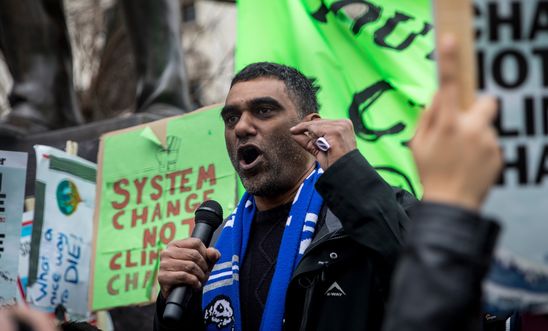
UK schools must let children strike

This blog was written by Amnesty International’s Secretary General, Kumi Naidoo.
This month, young people are organising demonstrations in towns and cities around the world calling for urgent climate action.
I have written to almost 25,000 schools in the UK with a request to neither prevent nor punish pupils from taking part in the global days of strikes planned for 20 and 27 September because I believe that the cause for which these children are fighting is of such historic significance.
The climate emergency is the defining human rights issue for this generation of children. Its consequences will shape their lives in almost every way imaginable.
The failure of most governments to act in the face of overwhelming scientific evidence is arguably the biggest inter-generational human rights violation in history.
Young people lead the way forward
I was expelled from school at 15 for organising an anti-apartheid protest at my school in Durban, South Africa.
This setback redoubled my commitment to learning, and thankfully I was able to complete my studies and ultimately take up the role I have the honour of holding today. But I also had something that children of this generation do not have: the chance to imagine a future that is not overshadowed by the prospect of a climate emergency.
My experience also informed my strong belief that children should not be punished for speaking out about the great injustices of our age.
When it has fallen on young people to show the leadership that many adults who hold great positions of power have failed to, it is not young people’s behaviour we should be questioning. It is ours.
My letter to headteachers
To school leaders around the world,
My name is Kumi Naidoo and I am the Secretary General of Amnesty International, the world’s largest human rights organisation. I am writing to you today about what I believe to be the single most important issue facing our current generation of children and how you can play a key role in enabling them to take action.
As you will know well, the past year has seen an unprecedented wave of activism from children across the world in response to the climate emergency facing our planet. Inspired by the example of Greta Thunberg, more than a million young people from dozens of countries have joined the Fridays for Future movement and other youth-led groups, participating in demonstrations that have often meant skipping school.
The fact that children are missing classes to take part in this movement has, understandably, provoked strong reactions and concerns. I understand the pressures you face as school leaders in navigating this challenge. Indeed, Amnesty International has campaigned on the right of all children to receive a quality education.
But, I believe that the cause for which these children are fighting is of such historic significance that I am writing to you today with a request to neither prevent nor punish your pupils from taking part in the global days of strikes planned for 20 and 27 September.
The climate emergency is the defining human rights issue for this generation of children. Its consequences will shape their lives in almost every way imaginable. The failure of most governments to act in the face of overwhelming scientific evidence is arguably the biggest inter-generational human rights violation in history.
Human rights exist to help us live together in freedom, justice and peace. But none of that is possible without a liveable planet.
The right to a healthy environment, including a safe climate, is essential for the enjoyment of so many other rights. It is a right that sadly, children today have been forced to take the lead in asserting.
By taking part in these protests, children are exercising their human rights to freedom of expression, peaceful assembly, and to have a say in decisions and matters that affect their lives. In doing so, they are teaching us all a valuable lesson: the importance of coming together to campaign for a better future.
Participants in the climate strike are human rights defenders. The Fridays for Future movement of schoolchildren have been named as winners of Amnesty International’s ‘Ambassador of Conscience’ award for 2019. Past awardees include Nelson Mandela, Malala Yousafzai, Ai Weiwei, Harry Belafonte, Joan Baez and Colin Kaepernick.
While watching these protests gather pace, I can’t help but be reminded of my own past. Aged 15, while at school in my native South Africa, I organised a protest against the apartheid system. I was expelled for this. It was a devastating moment for me. It was a very difficult moment for me and brought an overwhelming fear about how it might affect my future.
This setback redoubled my commitment to learning, and thankfully I was able to complete my studies and ultimately take up the role I have the honour of holding today. But I also had something that children of this generation do not have: the chance to imagine a future that is not overshadowed by the prospect of a climate emergency.
My experience also informed my strong belief that children should not be punished for speaking out about the great injustices of our age. In fact, when it has fallen on young people to show the leadership that many adults who hold great positions of power have failed to, it is not young people’s behaviour we should be questioning. It is ours.
Thank you for considering my plea and I hope that, working with students, parents and your staff, you will be able to support this critical moment in history.
With respect,
Kumi Naidoo
Secretary General of Amnesty International
Our blogs are written by Amnesty International staff, volunteers and other interested individuals, to encourage debate around human rights issues. They do not necessarily represent the views of Amnesty International.
0 comments